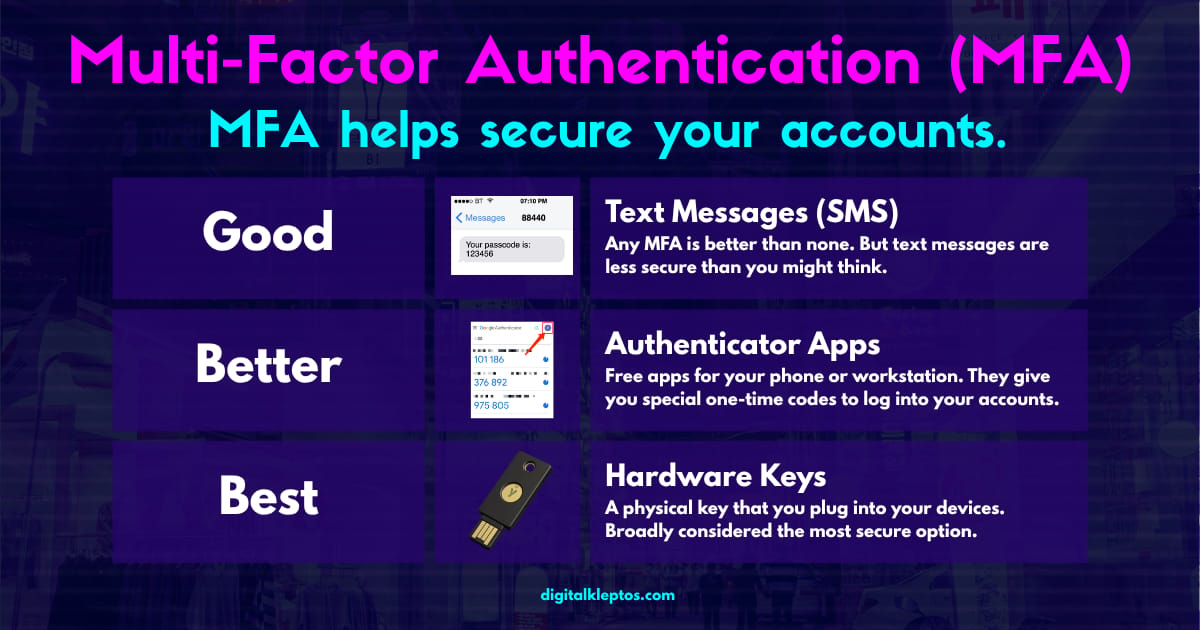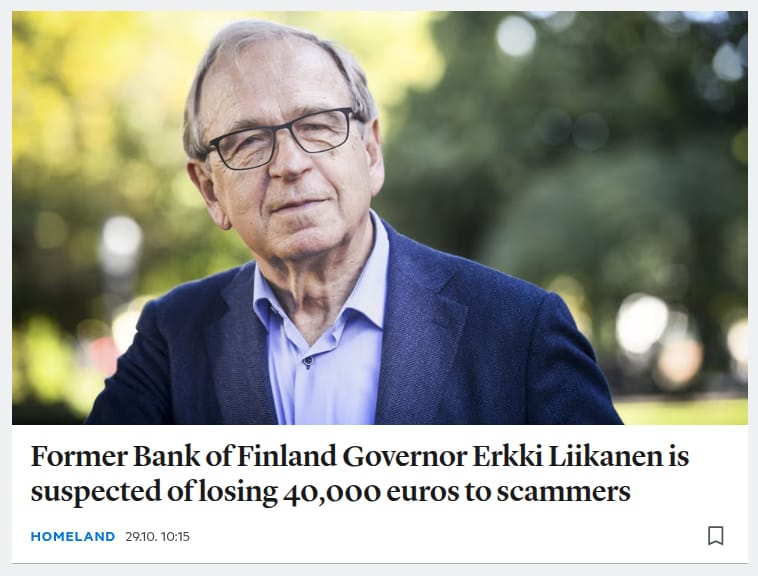- Digital Kleptos
- Posts
- Multi-factor Authentication (MFA): Is It Really Worth The Trouble?
Multi-factor Authentication (MFA): Is It Really Worth The Trouble?
How much “bang for the buck” does MFA give you?

Happy Tuesday! Adding layers of security to your online life causes some amount of friction. Sometimes people wonder if the friction is worth the trouble. Just how much juice do you get for the squeeze? Benjamin Franklin said “An ounce of prevention is worth a pound of cure.” This applies to the Internet in a profoundly meaningful way. Was the guy seeing into the future? He didn’t get his face on every $100 bill by being wrong more often than right! |  |
It’s so much easier to set up MFA on your bank account than to deal with a shocking and unexpected $0 bank balance. Once set up, the added friction might be nothing more than simply pressing a button on a YubiKey when it lights up each time you log in. Not a bad price to pay for peace of mind.
I watched a coworker get hacked 4 times in one year. As you can imagine, this caused a lot of pain, guilt and heartache. Could some, most, or all of it been avoided? Absolutely. But blaming people after the fact doesn’t help.
Brushing your teeth is kind of a hassle, but we still do it because an “ounce” of brushing is far better than the “cure” of spending hours in the dentist’s chair. And a confident, dazzling smile is an asset.
Whether you call it 2-factor authentication or Multi-factor authentication, it absolutely IS worth the slight amount of friction it adds.
— Anthony Collette
Founder, Loistava Information Security
Why should you use multi-factor authentication?
The World has changed, and the passwords of the past don’t protect our online accounts like they used to. When logging in to an online account, what you’re really doing is proving it’s actually you trying to log in. That’s why passwords were originally designed, as a secret only you would know.
But passwords by themselves aren’t enough for many of our most sensitive and important online accounts like email, banking, investment, cryptocurrency, etc.
The goal is to prove that it’s really you, and not some Digital Klepto™ trying to hack into your account and steal something.
What is multi-factor authentication and why does it work?
MFA is a way to verify that it’s actually you trying to log in to an online account. And when you turn it on, your accounts are far more secure than with passwords alone.
Sites verify your identity by using a combination of different types of “factors”. When logging in, the site verifies:
Something You Know (a password or PIN)
Something You Have (a security key or phone), or
Something You Are (fingerprint or facial scan).
The whole point is to prove to the site that whoever is knocking on their door screaming “let me in — right now!” is actually the real owner of that particular online account. Adding this layer of security keeps the bad guys out of your accounts, and only lets you in.
Because of large-scale experiments by Google and other companies, we know the strongest forms of MFA work incredibly well.
Why is multi-factor authentication more safe?
The Internet is awesome, but it’s also like the Wild Wild West. Online crimes against the public are exploding. Thousands of us are hacked every day, losing access to online accounts or seeing bank balances drained.
Why does this happen on such a huge scale?
Turns out it’s extraordinarily difficult to secure online systems. Passwords were the first line of defense, but hackers have become far more effective — they’ve upped their game and automated many attacks. In an ideal World, the technical folks who design online systems would make them completely secure. But until that day comes, it’s up to us to do what we can. And one thing we absolutely can do is use MFA to keep the Digital Kleptos™ out of our accounts.
Is multi-factor authentication unhackable?
Nothing in this World is perfect, although some things are definitely better than others. The Digital Kleptos™ of the World use various ways of hacking MFA: Social Engineering, Spoofed Landing Pages, Man-In-The-Middle Attacks, SIM Swapping, and MFA Prompt Bombing. Most information available about MFA hacking is geared for highly technical people who secure websites. But for us regular Internet users, the takeaway is simple: hackers try really hard to get around any safeguard. It’s up to us to use the best MFA available for our most sensitive accounts.
What is the main disadvantage of MFA?
MFA adds a small amount of friction to our online experience.
Also, for most people the main disadvantage of MFA or two-factor authentication is that we’re simply not familiar with the relative strengths of the various options available. Which MFA option should we choose to add this extra security layer? You can think of these options as existing along a spectrum of good > better > best. A great strategy is to choose the strongest form of MFA each online account offers. If someone tries to hack into your online accounts, make it as difficult for them as possible.
What is safer than MFA?
At the moment, the only approach safer than using MFA to secure your online accounts is to stay off the Internet. Is that workable for you? (Probably not)

It Can Happen To Anyone!
Look at this photo, what do you see? Probably the exact opposite of some trendy celebrity, right? Definitely not another Kardashian. Erkki Liikanen served as Governor of the Bank of Finland from 2004 to 2018 and as a member of the Governing Council of the European Central Bank. He was an EU Commissioner from 1995 to 1999, responsible for budget and human resources matters and information technology.
Liikanen was also the Minister of Finance in Finland’s government and a member of parliament for almost 20 years. In other words, he was wise, experienced, and enjoyed a long and successful career. Finland is one of the most well-educated, highly-literate countries in the World. As a society, there’s a very noticeable emphasis on STEM (science, technology, engineering, math). They even train their grade schoolers how to spot misinformation online!
But even someone as worldly-wise and accomplished as Mr. Liikanen fell victim to an online fraud and was hacked, resulting in 40,000 euros stolen from his accounts. This story in Finland’s AamuLehti (morning news) proves the point. If this can happen to someone with Mr. Liikanen’s experience, it can happen to anyone.
Serious About Staying Safe Online? Here’s What You Can Do.
We’re now living a huge portion of our modern lives online. Every day, hackers and scammers are targeting all age groups and demographics.
We’re definitely not living in one of those old western movies — no cavalry is triumphantly galloping over the hill to save us. It’s up to us to do what we can to make ourselves safer online.
There are no guarantees in life. But fortunately, adding MFA to your online accounts works extremely well. You can massively stack the deck in your favor by intelligently adding highly-effective MFA to your online experience.
Then pop a cork! Celebrate what you’ve accomplished!
Join us
Weekly resources to help keep you safer online — protecting you from hackers, online scammers, and other Digital Kleptomaniacs™.
No spam. No selling your email. Just factual, actionable information once a week, from people who truly care about online security. You can unsubscribe any time — but we hope you’ll want to stay with us on this journey.
Cybersecurity is a modern form of wealth, and you deserve to keep what you've earned.
Looking forward to connecting again next week.
— Anthony Collette
Reply